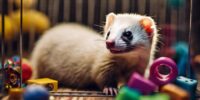How to Recognize Signs of Malnutrition in Ferrets
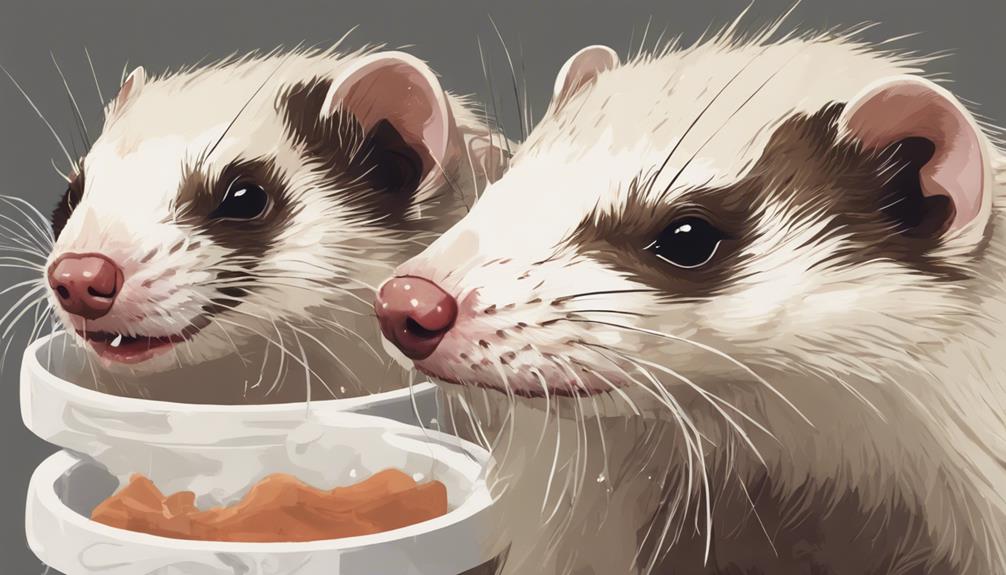
Malnutrition in ferrets can manifest in various ways, affecting their overall well-being. Some key indicators to watch out for include weight loss, poor coat condition, lethargy, and decreased appetite. Additionally, if a ferret is not receiving adequate nutrition, it may show signs of muscle wasting, weakness, or even behavioral changes. It is crucial to monitor their diet closely and seek veterinary advice if any of these symptoms are observed.
Ferrets have specific dietary requirements, including high protein and fat content, as well as certain vitamins and minerals. Providing a balanced diet is essential for their health and preventing malnutrition. Regular vet check-ups and consultations with a ferret-savvy veterinarian can help ensure that your pet is getting the proper nutrition it needs to thrive.
Weight Loss
Weight loss in ferrets can be an early indicator of potential malnutrition, requiring prompt attention from ferret owners. When a ferret experiences unexplained weight loss, it's crucial to take action swiftly.
One essential step is to make dietary adjustments to ensure the ferret is receiving adequate nutrition. This may involve switching to a high-quality ferret food or adding in nutritional supplements under the guidance of a veterinarian.
Monitoring progress is key during this time. Ferret owners should keep a close eye on their pet's weight and overall condition to assess the effectiveness of the dietary changes.
If weight loss persists or other concerning symptoms arise, seeking veterinary care is imperative. A veterinarian can provide further guidance on the best course of action and may recommend additional tests or treatments to address the underlying cause of the weight loss.
Dull Coat

A lackluster fur appearance in ferrets can serve as a noticeable indicator of potential malnutrition. When assessing a ferret's coat for signs of malnutrition, the following aspects of coat texture and nutritional deficiencies should be considered:
- Dull and Dry Coat: Malnutrition can lead to a lack of essential nutrients, resulting in a dull and dry coat that lacks the usual luster and smoothness.
- Patchy Fur Loss: Nutritional deficiencies can cause patchy areas of fur loss, making the coat look uneven and unhealthy.
- Brittle Hair: Inadequate nutrition can lead to the hair becoming brittle and prone to breakage, affecting the overall coat quality.
- Changes in Color: Nutritional imbalances may alter the pigmentation of the fur, leading to changes in color intensity or uneven color distribution.
Monitoring these coat characteristics can help detect potential malnutrition early on, prompting appropriate dietary adjustments and veterinary intervention to ensure the ferret's health and well-being.
Lethargy
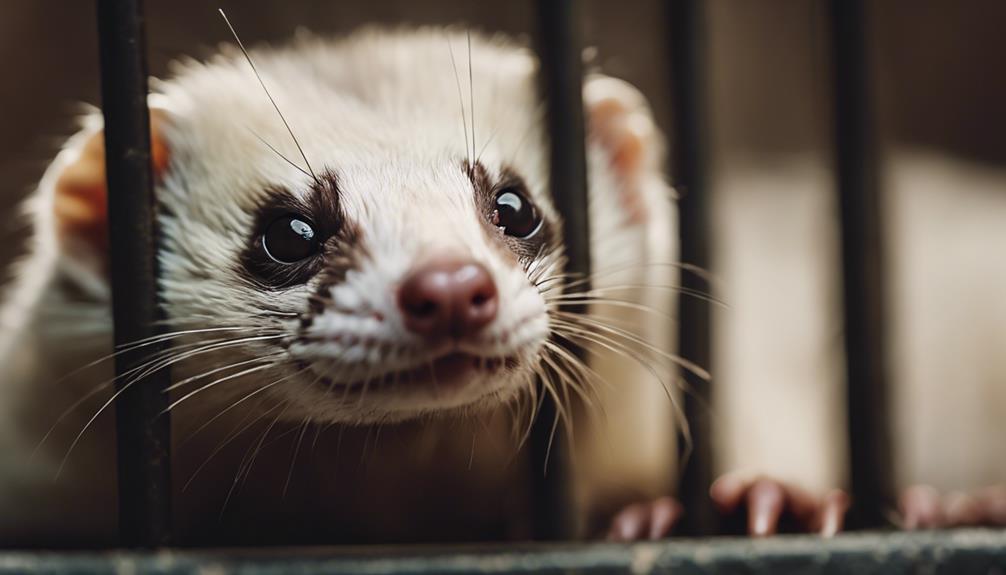
Ferrets experiencing malnutrition may exhibit lethargy, characterized by a lack of energy and reduced activity levels. Owners might notice their ferret being excessively sleepy, spending more time curled up and resting than usual.
Monitoring changes in your ferret's activity levels can provide important clues to their overall health and nutritional status.
Lack of Energy
Lethargy in ferrets can manifest as a noticeable decrease in their usual activity levels and overall movement. When observing a ferret for signs of lack of energy due to malnutrition, consider the following:
- Decreased Playfulness: A malnourished ferret may show less interest in toys or interactive activities.
- Reduced Exploration: Ferrets usually have inquisitive natures, so a lack of energy may result in decreased exploration behavior.
- Sleeping More: Excessive sleeping or prolonged napping periods can indicate a lack of energy.
- Sluggish Movements: Malnourished ferrets may move more slowly or appear less agile than usual.
To address these signs, ensuring the ferret's diet includes proper dietary supplements and maintaining their nutritional balance is crucial in promoting their overall well-being.
Reduced Activity Levels
When malnutrition affects ferrets, their reduced activity levels can serve as a critical indicator of underlying health issues. Ferrets are naturally energetic animals, so a noticeable decrease in their activity may signal a problem. It's essential to ensure that ferrets receive proper nutrition to meet their exercise requirements and maintain a healthy lifestyle.
Along with a balanced diet, providing environmental enrichment like toys, tunnels, and playtime can help keep ferrets active and engaged. Monitoring their activity levels regularly is crucial in identifying any signs of malnutrition early on. By promoting a stimulating environment and meeting their exercise needs, ferret owners can help prevent lethargy and ensure their pets lead happy, healthy lives.
Excessive Sleepiness
Experiencing prolonged periods of excessive sleepiness can be a concerning indication of potential malnutrition in ferrets. When observing a ferret showing signs of lethargy, it's crucial to consider their well-being.
Here are some key points to help identify excessive sleepiness as a sign of malnutrition:
- Changes in Sleep Cycle: Noticeable alterations in the ferret's usual sleep patterns may indicate underlying health issues.
- Decreased Energy Levels: A lack of energy and enthusiasm for play or exploration could signal a problem.
- Unresponsiveness: Ferrets that are unusually unresponsive or slow to react might be suffering from malnutrition.
- Increased Time Spent Sleeping: If a ferret is spending significantly more time sleeping than usual, it could be a red flag for malnutrition.
Muscle Wasting

Occasionally, ferrets experiencing malnutrition may exhibit noticeable muscle wasting, characterized by a visible loss of muscle mass and tone. Muscle wasting in ferrets can be a sign of serious underlying issues such as muscle atrophy, weakness, and nutritional deficiency, leading to frailty. It is crucial for ferret owners to be vigilant for any changes in their pet's physical appearance, especially in the muscle tone and mass, as these can indicate malnutrition.
| Signs of Muscle Wasting in Ferrets | Description | Importance |
|---|---|---|
| Loss of muscle mass | Visible reduction in muscle size | Indicates potential malnutrition |
| Decreased muscle tone | Muscles feel softer and less firm | Suggests lack of proper nutrition |
| Weakness | Lack of strength or energy | Impacts overall health and mobility |
Observing these signs early on can help prevent further complications and allow for timely intervention to address the underlying nutritional deficiencies causing muscle wasting in ferrets. Owners should consult a veterinarian promptly if they notice these symptoms to ensure their ferret receives appropriate care and treatment.
Poor Appetite
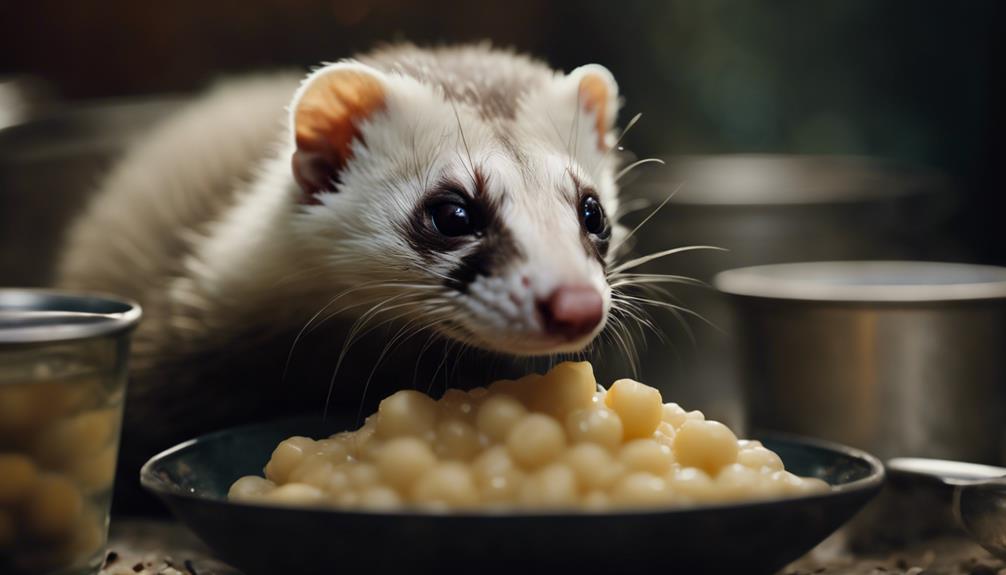
Poor appetite in ferrets can be a concerning sign of malnutrition. Weight loss is a common indication, often accompanied by reduced food intake.
Additionally, lethargy and weakness may manifest in ferrets with poor appetite, signaling potential health issues that need prompt attention.
Weight Loss Indication
A common indication of weight loss in ferrets is a noticeable decrease in their usual appetite. When observing a ferret's poor appetite, consider the following:
- Dietary Adjustments: Changes in the type or amount of food consumed.
- Nutritional Supplements: Lack of interest in supplements that were previously consumed.
- Hydration Levels: Reduced water intake leading to dehydration.
- Feeding Schedule: Refusal to eat at regular meal times or ignoring treats.
Monitoring these signs closely can help in detecting weight loss early. If a ferret shows persistent poor appetite, it may require veterinary attention to address any underlying health issues contributing to the decreased food consumption.
Reduced Food Intake
Noticing a decreased food intake in ferrets can be a crucial indicator of potential malnutrition. Ferrets that exhibit poor appetite may be at risk of developing nutrient deficiencies, which can have serious implications for their overall health.
Nutrient deficiency in ferrets can lead to a variety of health issues, affecting their immune system, coat quality, and digestive health. It's essential to monitor your ferret's food intake closely and consult with a veterinarian if you notice a persistent lack of interest in eating.
Ferrets rely on a balanced diet to maintain their well-being, and any prolonged reduction in food consumption should be addressed promptly to prevent malnutrition-related complications. Observing changes in appetite can provide valuable insights into your ferret's health status.
Lethargy and Weakness
Lethargy and weakness in ferrets can signal underlying health issues, potentially linked to poor appetite. When observing these signs in your ferret, consider the following:
- Nutritional supplements: Providing high-quality, easily digestible supplements can help meet their dietary needs.
- Veterinary examination: A vet can assess your ferret's overall health and recommend a suitable diet plan.
- Encouraging hydration: Ensure fresh water is always available, as dehydration can exacerbate lethargy.
- Exercise regimen: Regular playtime and physical activity can stimulate appetite and improve their overall well-being.
Monitoring your ferret closely and making appropriate adjustments to their diet, supplements, and exercise routine can help combat lethargy and weakness caused by poor appetite.
Digestive Issues
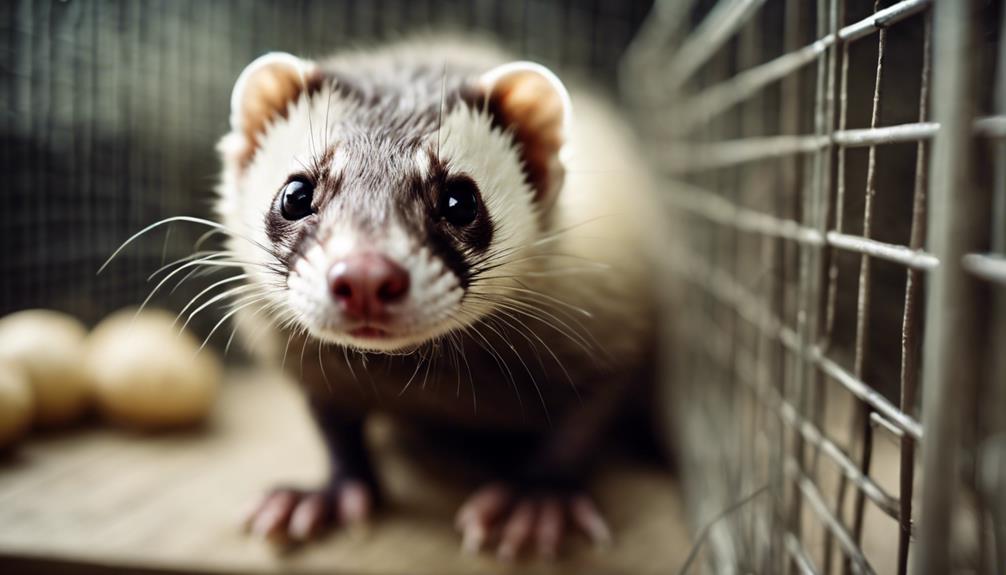
Ferrets commonly experience digestive issues due to their sensitive digestive systems, making it crucial for owners to monitor their food intake and behavior closely. Digestive problems in ferrets can manifest as diarrhea, constipation, vomiting, or lack of appetite. These issues can often be linked to dietary adjustments, hydration concerns, and overall digestive health. Owners should ensure their ferrets have access to fresh water at all times and provide a balanced diet rich in protein and low in carbohydrates.
To help manage digestive issues, nutritional supplements like probiotics can be beneficial. Probiotics promote a healthy gut flora balance, aiding in digestion and nutrient absorption. Additionally, offering occasional treats of cooked eggs or pumpkin can help regulate bowel movements.
Below is a table summarizing common digestive issues in ferrets and suggested solutions:
| Digestive Issue | Symptoms | Solutions |
|---|---|---|
| Diarrhea | Loose stools | Probiotic supplements, bland diet |
| Constipation | Straining in the litter box | Increased water intake, pumpkin treats |
| Vomiting | Regurgitation of food | Small, frequent meals, vet check |
| Lack of Appetite | Refusal to eat | Warm, diluted duck soup, vet visit |
Behavioral Changes
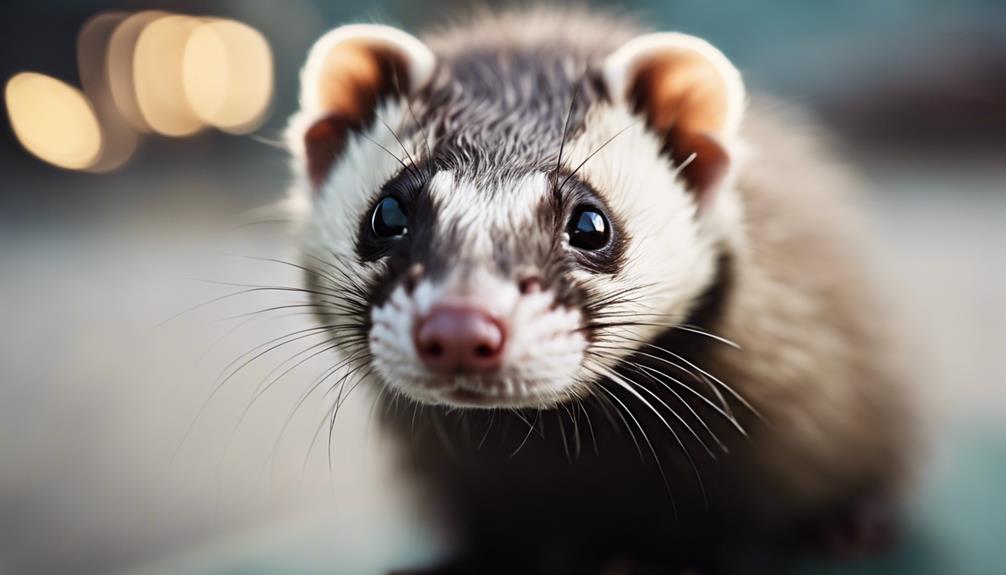
Observing changes in a ferret's behavior can provide valuable insights into their overall well-being and health status, complementing the monitoring of digestive issues. When assessing a ferret for signs of malnutrition, paying attention to behavioral changes is crucial. Here are some key behavioral indicators to watch for:
- Decreased Playfulness: A once lively and energetic ferret may show a lack of interest in playtime activities.
- Increased Lethargy: Malnourished ferrets may appear more tired and sluggish than usual.
- Isolation: Withdrawal from social interactions and spending more time hiding could signal underlying health issues.
- Aggression or Irritability: Malnutrition can sometimes manifest as increased aggression or irritability towards both humans and other ferrets.
Frequently Asked Questions
Can Malnutrition in Ferrets Be Caused by a Specific Medical Condition or Disease?
Malnutrition in ferrets might arise from genetic predisposition or nutritional imbalances due to specific medical conditions or diseases. It is essential to observe closely for signs of inadequate nourishment to ensure their well-being.
Are There Any Specific Vitamins or Supplements That Can Help Prevent Malnutrition in Ferrets?
Nutritional supplements can enhance a ferret's diet to prevent malnutrition. Proper vitamin intake is crucial for their health. Owners should consult with a veterinarian to determine the best supplements and ensure a balanced diet.
How Often Should a Ferret's Diet Be Adjusted to Prevent Malnutrition?
Ferrets' diet adjustments should occur regularly, typically every 6-8 weeks, based on weight monitoring. Consistent observation and adjustment ensure optimal nutrition. Just like a well-tuned instrument, a balanced diet keeps ferrets in harmony.
Can Stress or Changes in Environment Contribute to Malnutrition in Ferrets?
Stress-induced malnutrition in ferrets can result from sudden changes in their environment. Environmental factors like temperature fluctuations or inadequate shelter may also contribute. Monitoring these elements and providing stable conditions are crucial for their well-being.
Are There Any Behavioral Indicators That May Signal Malnutrition in Ferrets Before Physical Symptoms Appear?
Behavioral changes in ferrets, such as decreased activity or increased irritability, can indicate malnutrition before visible weight loss. Observing these signs early on can prompt dietary adjustments or veterinary care to prevent further complications.




